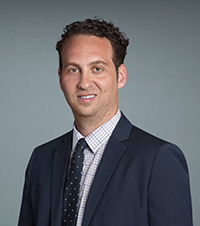Office of Research & Development |
 |


Hearing loss is very common as people age, especially in Veterans who were exposed to excessive noise during their military service. VA provides a spectrum of services and resources for Veterans with hearing loss. (Photo for illustrative purposes only. ©Getty Images/DuxX)
July 1, 2022
By By Erica Sprey
VA Research Communications
"The VA has been a leader in hearing health care for a number of years providing hearing aids and auditory rehabilitation for Veterans who need them."
Dr. David Friedman is a neurotologist and skull-base surgeon at the Manhattan New York Harbor VA Medical Center. He is also an associate professor in the Department of Otolaryngology-Head & Neck Surgery at NYU Grossman School of Medicine in New York, New York.
He provides otologic care for any ear or hearing-related issues, including chronic ear disease and cochlear implantation. Additionally, he is a VA researcher studying the management of Veterans with severe hearing loss.

Dr. David Friedman is a neurotologist and skull-base surgeon at the Manhattan New York Harbor VA Medical Center.
VA Research Currents recently talked to Friedman about clinical care for Veterans with severe hearing loss, which is the focus of his ongoing VA HSR&D-funded project.
Research Currents: Can you tell us what an otolaryngologist does?
Otolaryngology, which is more informally known as ear, nose, and throat (ENT), encompasses both medical and surgical care for any issues in the head and neck region—usually exclusive of the brain and the eyes, which are separate medical specialties. There is a lot of collaboration between ENT doctors and neurologists, neurosurgeons, ophthalmologists, and oral surgeons to care for diseases and conditions related to the head and neck.

Veteran disability payments led to fewer hospitalizations

Air Force Veteran among 10 new awardees in VA diversity, equity, and inclusion research program

VA researcher leads project to evaluate Veteran screening for malnutrition

VA joins alliance to boost access to ‘decentralized’ clinical trials
My subspecialty within ENT is neurotology, which focuses on the interface between the ear, the facial nerve, and the brain. We address ear problems that can include fluid behind the ears, infections, and tumors at the base of the skull; they can all cause hearing loss. Additionally, we may manage hearing loss from a variety of other causes including age-related decline and hearing loss related to excessive noise exposure.
Research Currents: Can you tell us what a cochlear implant is, and what the procedure involves?
Hearing loss is very common as we age, especially in those exposed to excessive noise, such as in the military. Hearing loss encompasses a spectrum, from people who have normal hearing but describe difficulties hearing in environments with background noise all the way to people who have no hearing, who are essentially deaf. Historically the options for patients with hearing loss were more limited than they are today. They included hearing aids that amplify or make sound louder.
Cochlear implants, which are a remarkably successful neural prosthesis, may provide clarity to assist with speech understanding for patients with severe or worsening hearing loss when hearing aids are not providing adequate benefit. Patients who might be candidates for cochlear implants include children born without the ability to hear. At the other end of the spectrum are adults who had normal hearing, or hearing that was amenable to amplification with hearing aids, but over time progressed to the point where amplification wasn't helpful, and went on to get cochlear implants. That could include adults with genetic conditions, those who were subjected to loud noises and had progressive hearing loss, or those who have presbycusis (age-related hearing loss).
Research Currents: How does a cochlear implant help the brain understand speech?
The way we hear normally is through acoustic vibrations in space. The vibrations contact our ear drum and displace the ossicles, or tiny middle ear bones, creating fluid waves in the cochlea. Those waves deflect hair cells within the cochlea, which stimulate different neurons within the auditory nerve that connects to the brain and that we perceive as sound. So, there is acoustic energy, which is the initial vibrational sound wave, transduced into electrical signals that are transmitted along the auditory nerve to the brain, which translates those auditory signals into discernible sounds that are the building blocks of spoken language.
Cochlear implants are different than hearing aids. The cochlear implant allows us to bypass the function of the outer and middle ear. Essentially, it takes those acoustic vibrations in the environment and directly stimulates the auditory nerve, bypassing the usual mechanisms of hearing.
The VA has been a leader in hearing health care for a number of years, providing hearing aids and auditory rehabilitation for Veterans who need them. The cochlear implant has been FDA approved since the 1980s. Since that time, cochlear implants have been available through the VA for Veterans who need them. They require an ambulatory surgical procedure to place the device under the skin and insert the delicate electrodes into the inner ear structure. Cochlear implants also involve an external speech processor that attaches through the skin with a magnet that then communicates with the internal device.
When cochlear implants were first being developed and used in humans, expected outcomes were much more modest than what we have come to expect from cochlear implants today. If you could tell the difference between a person's voice and an environmental sound, like a horn honking, then your hearing would likely have been considered too good for a cochlear implant.
Improvements to the technology, identification of appropriate candidates, and selection of patients who had a shorter duration of hearing loss have led to significant improvement in outcomes with cochlear implants. Now it's quite common for individuals with cochlear implants to have open-set speech recognition—meaning they can understand speech when they don't have access to visual cues, such as when using a telephone. This can be a transformative improvement in quality of life, social engagement, and independence. Many Veterans report that their cochlear implants allow them to overcome difficulties posed by their hearing disability, allowing them to re-engage with their families and health care providers.
Research Currents: Hearing loss and tinnitus are the most common service-connected disabilities in VA. How many Veterans are affected by hearing loss?
Veterans are potentially subject to the same issues that we all are—genetic predisposition, aging, environmental factors. However, during active military service, Veterans may have significant noise exposure. There is some evidence that their age-related hearing loss actually accelerates related to these experiences. So, we see more hearing loss at an earlier age, and ultimately, they are more severely affected over time.
We only know the number of patients with hearing loss for those who are receiving care through VA because of the extensive databases within the VA system, which includes the audiometric repository. To make hearing health care even more accessible, Veterans no longer need a referral for a hearing test—they can schedule their own hearing test by calling audiology directly.
There are about a million Veterans who receive compensation related to hearing loss. In the VA budget, about $300 million dollars are spent on hearing aids annually, making VA the largest purchaser of hearing aids of any health care system.
Part of what we are trying to find out with our study is, of those Veterans who have had their hearing tested, how many have severe hearing loss? We hypothesize that in a population in which hearing loss is a prevalent problem, you may have even more people who are affected with severe hearing loss than the general population. That's part of what we are looking at.
Research Currents: Can you tell us about your study, and what you hope to find out?
We know that VA offers an incredible array of services and resources for Veterans with hearing loss. And we know that hearing loss is a chronic problem. But we are interested in examining ways in which severe hearing loss may be a distinct problem from lesser forms of hearing loss in terms of its management.
The treatment for mild or moderate hearing loss is in most cases hearing aids and counseling on effective communication strategies. But when you get into more severe losses, that may not be sufficient.
When we are assessing an individual's function, we are asking the question, "Does this patient have a degree of hearing loss or other characteristics that warrant a different treatment approach?” That could involve a distinct set of treatment options and related counseling. For example, a discussion about a cochlear implant is one such consideration for someone with severe hearing loss who is not benefitting from hearing aids. Another option may entail use of assistive listening devices, portable captioning devices, or remote accessories to help in difficult listening situations.
Our group is asking, “What are the individual factors, like Veterans, providers, audiologists, primary care providers, and the system factors that impact care? To what extent does the organizational structure facilitate appropriate and evidenced-based care for the individual?”
Most cochlear implants within VA are done at specialized Centers of Excellence around the country. This ensures high quality of care, but may mean that some Veterans have to travel a significant distance to one of these centers for cochlear implant care. This is an example of a structural factor that could impact health care delivery. Various steps have been taken to mitigate this as a barrier and make this technology more available, but it is not known how important of an issue this is for Veterans.
Patient factors might include how an individual feels they are managing functionally with their hearing—maybe they think they're doing great with hearing aids, or they are not familiar with what other options might help. Maybe they live a relatively isolated lifestyle and don't perceive problems with hearing loss, from a disability standpoint. Or in other cases, they may have actual or perceived limitations from other medical conditions that limit their options for hearing rehabilitation.
The idea for our study is to encapsulate this information―we have access to several unique data sources that we are linking together to give us a better picture of how severe hearing loss is managed in the VA.
Research Currents: Can you tell us what VA data resources are being used in your study?
The VA Audiometric Repository contains millions of audiograms―graphs that shows the results of hearing tests. It has unique value as a resource to help us improve care. In civilian settings, when we see patients with hearing loss considering a cochlear implant, we often have little information about how their hearing loss has progressed over time. They might have seen an audiologist in the community. We could ask them to bring in their records, but we might get only one or two old tests. However, within this repository we have longitudinal data, going back a number of years.
For example, we can ask for this individual Veteran, what did his hearing look like five years ago, 10 years ago? Was there a particular trigger point in his declining hearing that led to him to get a hearing aid or cochlear implant? We are trying to understand what audiologic factors go into the management of hearing loss, knowing that is only part of the story.
In addition to the repository, we are using a second unique VA data set, the VA Remote Order Entry System or ROES. This is a resource within VA for providers, such as audiologists, who order sensory prosthetics such as hearing devices―whether that is hearing aids, a cochlear implant, or assistive listening devices.
So, we can link the repository to ordering data to answer questions like, “At what point does a Veteran get a hearing aid, at what point does a Veteran get a cochlear implant?” We are also considering non-audiologic factors at play, including other health or medical conditions, by incorporating the electronic health record. There are also considerations in relation to health equity and demographic factors, like race and age, that impact who is getting certain treatments. For instance, are you more likely to get treatment if you are a certain race or age? Cochlear implants require a surgical procedure, albeit one in an ambulatory setting. It's possible that patients over a certain age are perceived as too old for this treatment. There are certainly some patients who have comorbidities and would not be good candidates for surgery.
Lastly, we are incorporating interviews with VA audiologists, medical providers, and Veterans with severe hearing loss to get their perspectives on this important issue. Our long-term goal is to ensure all Veterans with severe hearing loss receive individualized care based on their preferences and needs.
VA Research Currents archives || Sign up for VA Research updates